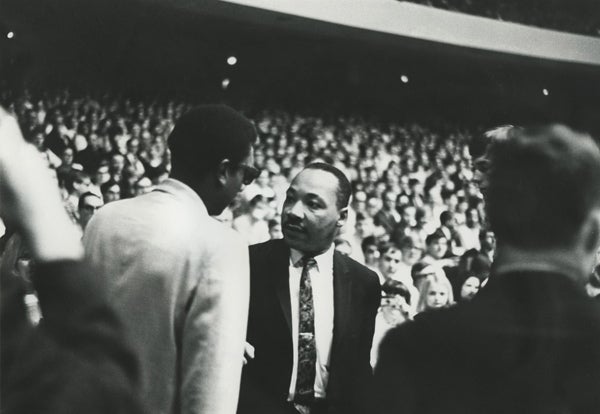Tensions were so high at Memorial Gym on the evening of April 7, 1967, that 40 plain-clothes police officers were scattered throughout the bleachers. Six officers stood outside, and a fleet of patrol cars circled the gym, just waiting for a confrontation.
A sellout crowd had gathered, not for a Commodore basketball game, but to listen to some of the country’s most relevant and controversial speakers on the first night of the student-run Impact Symposium—a program only in its fourth year at that point, but already considered, in the words of the late Arizona senator and GOP presidential nominee Barry Goldwater, as “the best college presentation of its kind in the country.”
In town for two nights of speeches were Rev. Martin Luther King Jr., Stokely Carmichael, Strom Thurmond and Allen Ginsberg—four electric figures dropped in the middle of what remained a relatively sleepy and nonpolitical campus, confronting students with disparate views on the most polarizing issues of the 1960s: war, peace, poverty, racism, drugs, social justice, freedom of speech and the role of authority.
The idea for Impact had grown out of a desire in the early ’60s to provide students with more intellectually stimulating programming outside the classroom. “Administrators, particularly Dean Sid Boutwell, gave the idea of a symposium backing in 1963,” wrote the chairmen of the first five Impact symposia in a 2017 op-ed in Vanderbilt Magazine. “But the university provided no budget. Impact was given life entirely by students.”
During its first few years, Impact was host to notables like Goldwater, civil rights leader Julian Bond and Alabama Gov. George Wallace. But it was the ’67 affair that cemented the symposium’s place as an iconic Vanderbilt tradition with a national reputation for excellence.
The event received heated criticism from some alumni, Board of Trust members, state legislators and local business leaders, but Chancellor Alexander Heard never wavered and continued to defend the value of the “open forum” concept, even when his job was on the line during a Board of Trust meeting. The Vanderbilt campus, he said, was a place where the free flow of ideas—even and especially controversial ones—was not only accepted, but encouraged.
“Impact ’67 is indeed a ‘signature moment’ in Vanderbilt history, partly because of the speaker roster, but primarily because its aftermath precipitated a showdown over Alexander Heard’s vision for the university as a vibrant national academic institution with a truly open forum,” the Impact chairmen wrote in the op-ed. “That vision was validated and fueled the trajectory of Vanderbilt as a national university from 1967 to today.”
Learn more about the history of Vanderbilt’s Impact Symposium.
